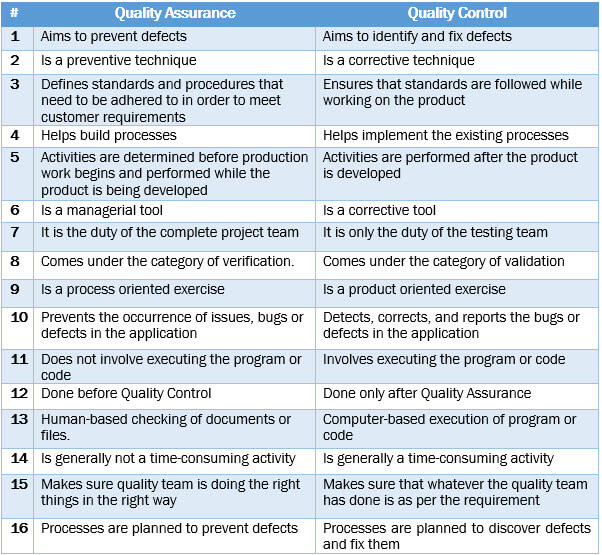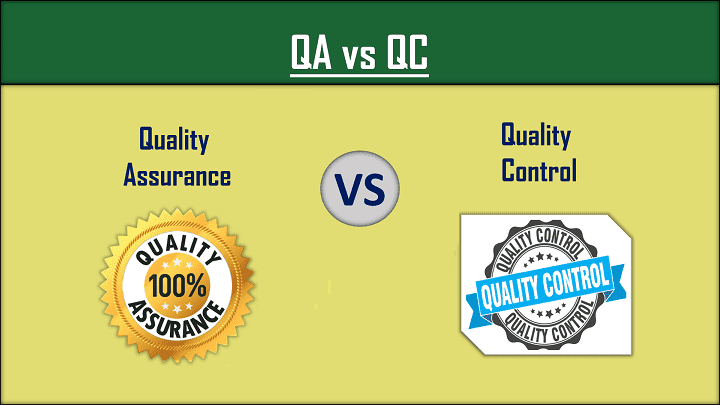In software testing, perhaps two of the most seemingly similar terms that confuse us are quality assurance (QA) and quality control (QC). The two terms share many similarities and not just the word “quality” (sometimes they are even used interchangeably). But the differences between them are not too difficult to notice.
So what are the differences between QA and QC in software testing? Let us breaks it down in the categories below:
1. By definition
First it is important to note that both QA and QC are part of quality management. The difference in definition, however, lies in the official description of each term by the International Organization for Standardization (ISO):
- Quality Assurance (QA): Part of quality management. It focuses on providing confidence that quality requirements will be fulfilled.
- Quality Control (QC): Part of quality management focused on fulfilling quality requirements.
2. By purpose
While the above definitions may sound confusing at first, we can explain in what QA and QC try to achieve to better understand the differences between QA and QC in software testing:
- QA deals a lot more with the “process”. It ensures quality and develops defect prevention measures during the development phase of software. The act of “providing confidence” – as part of QA – often begins very early into software development phase. QA then fulfill software qualities in the future.
- On the other hand, QC focuses a lot more on the software itself after producing it. This means that QC heavily leans towards defect identification post-production. QC does not focus on prevention at an earlier stage of development. Therefore, QC requires constant inspection and examination of the software. It aims to identify issues to ensure post-production quality before releasing to customers.
We can also draw from the above understanding: QA is a proactive process, in which it anticipates defects before they occur; QC is a reactive process which respond to defects only after completion of software.
3. By capabilities
Another way to understand the differences between QA and QC in software testing is looking at what they do.
- QA is pretty much a prevention system that predicts everything that can possibly go wrong with software (bugs, malwares, etc.) before and during development and sets up criteria for the software to determine its status before letting it reach the other stages of the development phase.
- QC is similar to a policeman; a detection system that searches for software flaws after successful development, primarily by the means of testing it to ensure that it meets the criteria before reaching the hands of customers.
4. By responsibility
The group of people who carry out assurance and control activities are also one of the key differences between QA and QC in software testing. Most of the time, QA and QC have specific people assigned to them as following:
- QA is normally conducted by project managers, the software development team, customers themselves, and sometimes by third-party examiners. Or simply put, QA involves the efforts of everyone assigned to developing the software.
- QC is mostly executed by a special team of people whose primary duty is to test the finished software. The QC department holds critical importance in that they test the software to identify and correct defects, in the process helping to polish and perfect it to deliver a satisfying customer experience later on, as it is very important to not let customers suffer from unchecked bugs after launching the software.
Regardless of the above differences between QA and QC in software testing, it is suffice to say that they hold equal importance to quality management of software. A QA/QC program usually serves as a Quality Management System (QMS), which software development companies utilize to save costs, time, and mitigate risks that may occur with their products.

5. Benefits of QA/QC
QA/QC, once performed together in software development, brings out many benefits for the development company, including:
- Satisfying clients with the final results of software, which increases a company’s reputation on the market. This also means the company will potentially have long-term strategic partners.
- Removing the excess time and costs for continually checking and fixing the software to deliver solutions. A carefully planned QA/QC strategy means that companies can always be confident of quality, avoiding unnecessary defects that occur when rushing the development to meet deadlines without proper evaluation.
- Monetary rewards for the company, since QA/QC helps to deliver the best quality of software, it also means customers are more likely to engage in future projects and refer to new potential partners, especially in the IT outsourcing world.
- The adoption of strict QA/QC strategies and plans when developing software gives a company’s software development team a sense of professionalism, perfectionism and more motivations to work more efficiently.
For further enquiries about QA & QC on software development and testing, please do not hesitate to contact HuviTek at:
- Message us
- Phone: +84 888 780 670
- Email: [email protected]
- Visit our website!




Kiana Wortham
April 24, 2022A fascinating discussion is definitely worth comment. I think that you ought to publish more about this topic, it might not be a taboo matter but usually people do not talk about these issues. To the next! Kind regards!!